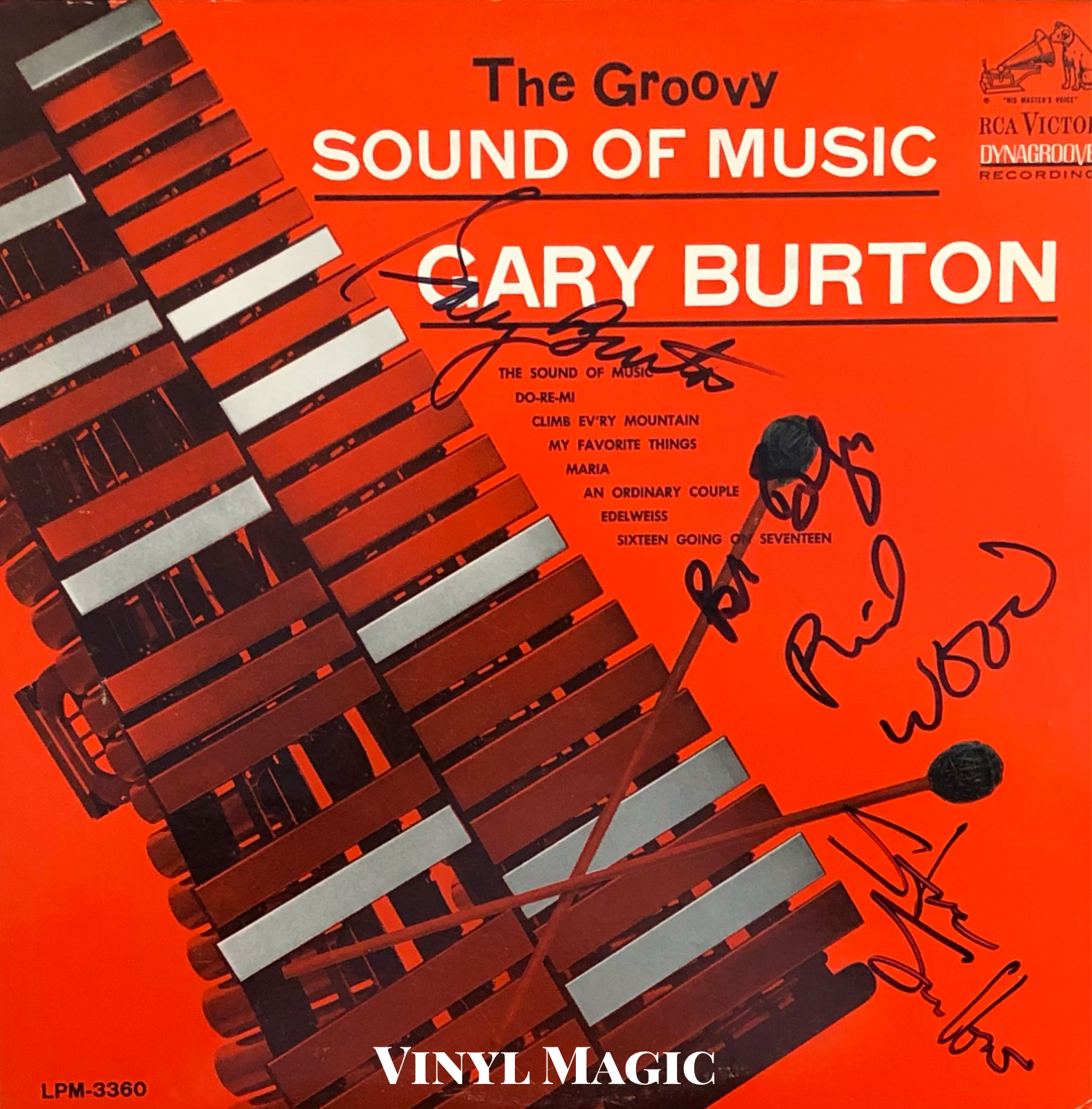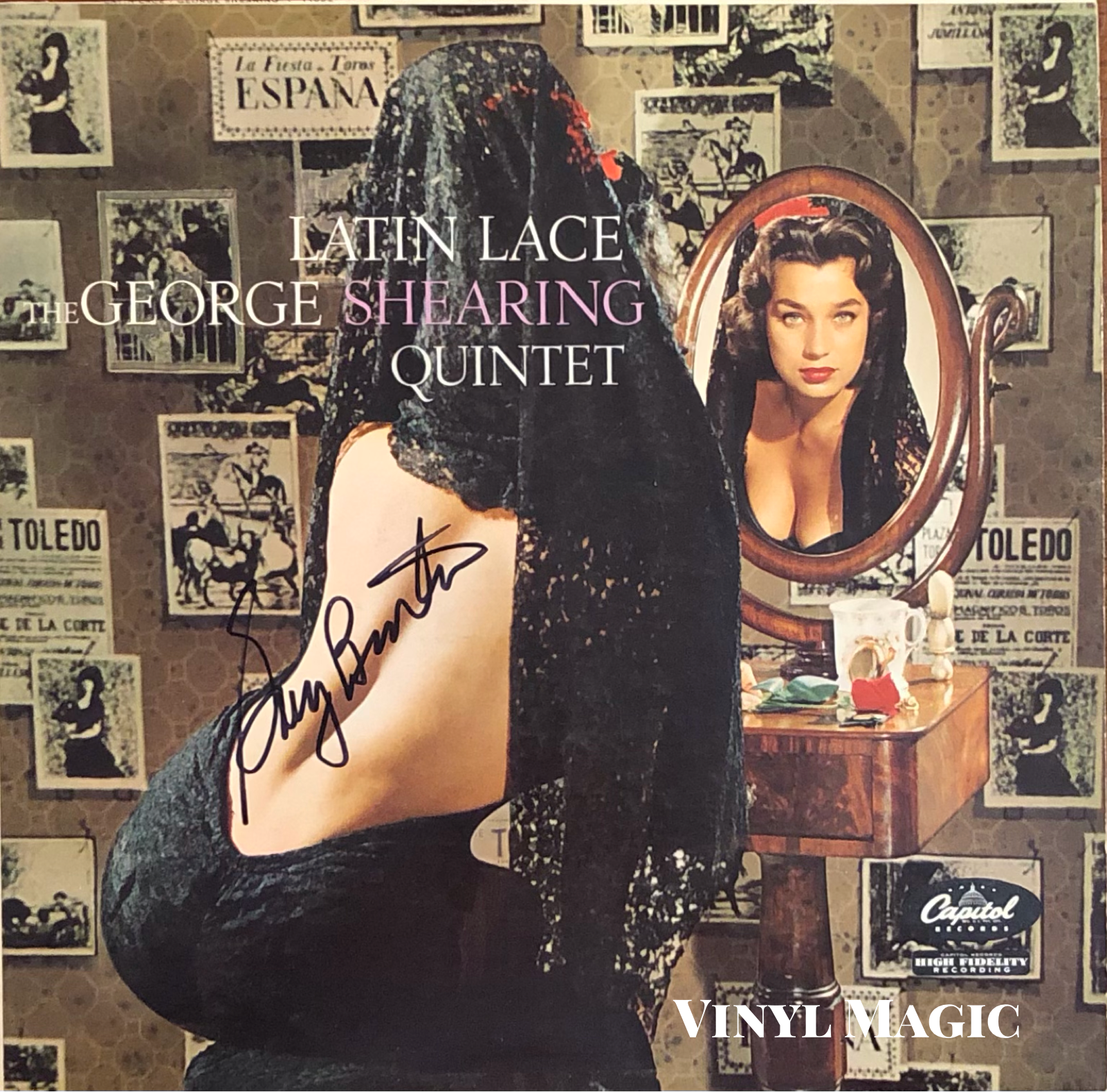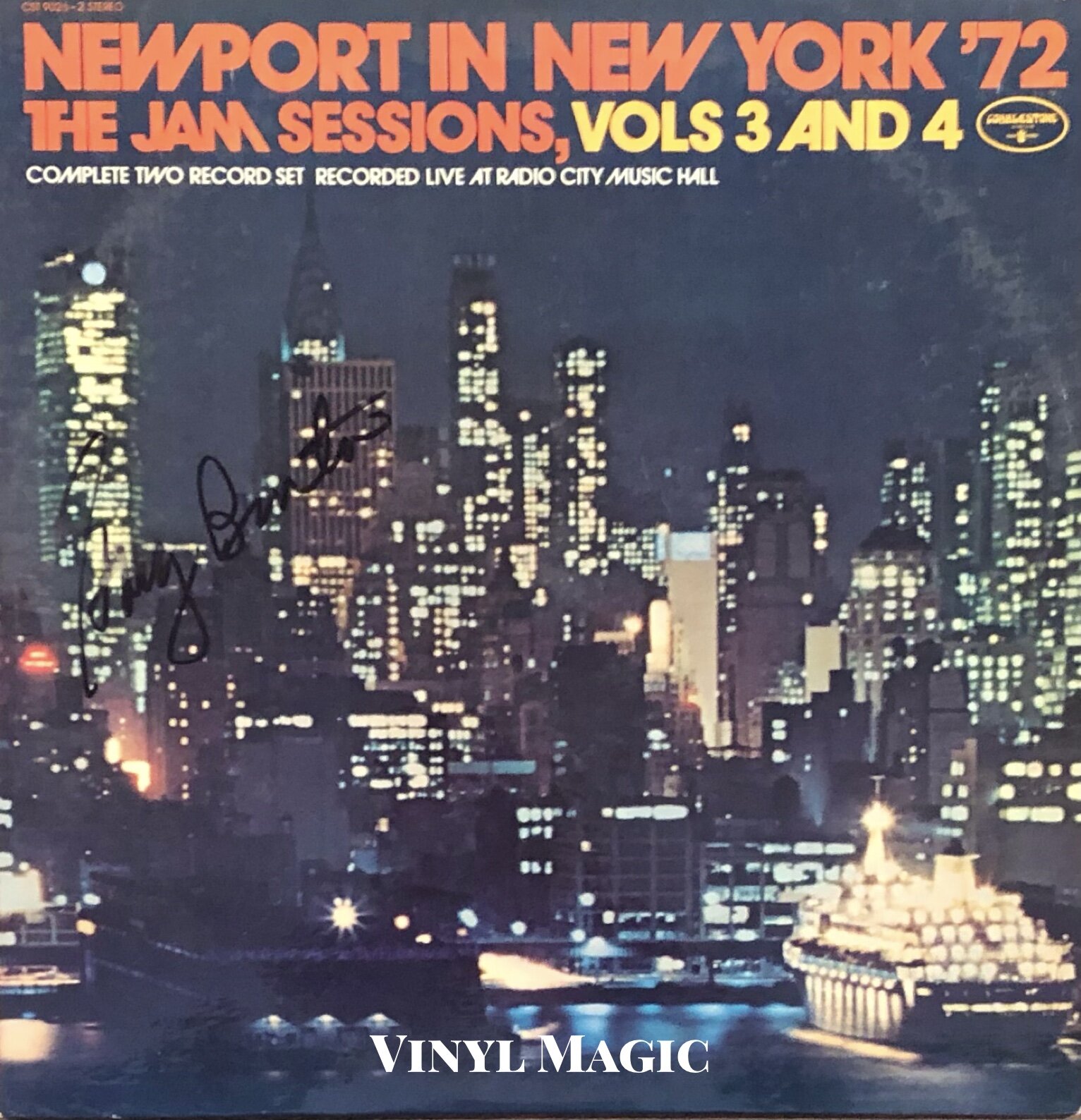Gary Burton and Me…
I grew up in a farm town in Indiana. In the early years I played by myself, because there were no other musicians around. And especially no one else who had an interest in jazz music that I had sort of discovered from records. So playing with just two mallets was so empty, wasn’t complete. I wanted some harmony to make the music sound complete. In high school, I started experimenting playing with four mallets more and more. And eventually by the time I was about ready to leave home, I had pretty much become a four mallet player. I was surprised when I finally moved to Boston and the East Coast, to discover that there weren’t that many vibraphone players around. And I was the only one playing with four mallets. I didn’t just dabble in it. I really committed myself to it and I developed a fair amount of independence of the mallets so I could really play it in a pianistic way. Which was something that no other players had done yet. So I’m credited, rightly or wrongly. I didn’t invent four mallet playing – I popularized it.
Gary Burton
The Groovy Sound Of Music (1965) signed by Gary, Bob Brookmeyer, Steve Swallow, Phil Woods
I’m pretty anti-putting-things-in-boxes. Every time I hear somebody say, “Jazz fell apart after the 1950s,” or lost its way, or whatever, I just shake my head and think, this is surprising, because the people who say that revere [musicians] who were iconoclasts. Their favorites are Duke [Ellington] and Thelonious [Monk] – people nobody understood at the time, who were constantly challenging audiences to keep up with them.
Gary Burton
To me, he was the epitome of what a great modern musician should be. He is a bottomless pit of ideas and melody. I think this gets a little bit lost because of the nature of the instrument he plays. With those four mallets flying around and the notes ringing the way they do, sometimes I feel like folks might miss the actual content of the ideas and the lines and are kind of wowed by the sight of it all.
guitarist Pat Metheny
The Time Machine (1966) signed by Gary
So many things I've done over the years have been influenced and inspired by Gary. If I'm playing a Bob Dylan song, or recording an album in Nashville, these are things he did decades ago. He showed me the possibilities. There are no limits. I can't imagine where I'd be or what I'd be doing right now if I hadn't heard Gary Burton. For more than 40 years he has been an inspiration.
guitarist Bill Frisell
Some musicians today want to stay in the past instead of looking ahead, trying to challenge themselves and move things forward. The nature of the art form, of all art forms, is you get classicists and people who break new ground. There’s room for everybody. I personally don’t have much interest in staying put or going backwards, certainly.
Gary Burton
Gary Burton & Keith Jarrett (1971) signed by Gary, Steve Swallow
Born in Anderson, Indiana, Gary Burton is a virtuoso vibraphonist with an unusual and uncommon jazz career. He has released more than sixty-five albums, appeared on hundreds of sessions, and collaborated with master musicians Chick Corea, Larry Coryell, Stan Getz, Herbie Hancock, and Keith Jarrett, to name a few. Winner of seven Grammys (along with twenty-one nominations), Gary once said, "One thing I’m most proud of about my career, the reason why my Grammys mean a lot to me, is they’re spread out over five decades. That says to me that my career wasn’t one period of success followed by a long fade. I’ve managed to sustain it at a high level all this time." No fade indeed, it has been a remarkable run for a farm boy who got his professional start in Nashville in 1960. Yes, Nashville, Tennessee was not exactly a hotbed of progressive jazz then, or now!
A Genuine Tong Funeral (1967 recordings) signed by Gary, Carla Bley, Steve Swallow
While jamming at saloons and local honky tonks in southern Indiana, Gary caught the ear of Boots Randolph, a noted Nashville session saxophonist who had attended high school in nearby Evansville, and was later well known for his hit "Yakety Sax", forever immortalized as the theme to The Benny Hill Show, that inscrutable arbiter of impeccable British taste and urbanity. Boots recommended that Gary move to Nashville for the summer (before attending Berklee College of Music) and Boots introduced him to Hank Garland, another seasoned Nashville session player who was looking to branch out with a foray into jazz.
Mister Guitar (1961) signed by Gary
Hank needed a vibraphone player, there were none available (unsurprisingly) in Nashville and Gary's chops were more than adequate. An unlikely alliance was forged. Or not so unlikely, as Gary revealed, "As I became more acquainted with country musicians, I discovered that a lot of them were big jazz fans. And I realized that the two [types of] music have a lot in common. They both feature improvised solos – the bluegrass music and the hot violin solo, and so on. So they have a lot of respect for the improvising in the jazz world. And the songs were a little different, but the concept of being a hot instrumentalist existed in both of those kinds of music. And so I came to have a lot of respect, and received a lot of enjoyment out of country music. I didn’t pay any attention to it at all when I was growing up. I was a real jazz snob. I knew nothing about classical music or country or pop or anything else. Jazz was my world when I was a teenager. That was a great experience in Nashville. It not only introduced me to the professional music world and got my career off to an early start, but it also very much broadened my awareness of what was out there in the music world."
Chet Atkins In Hollywood (1961) signed by Gary
The resulting vinyl, Hank Garland's Jazz Winds In A New Direction, released in 1961, was an unexpected departure for Garland who had been a featured guitarist on Elvis Presley, Patsy Cline, Roy Orbison and Faron Young recordings in the late 1950s and early 1960s. That was a heady summer in Nashville as Gary also sat in on pianist Floyd Cramer's "Last Date", a million seller that reached Number 2 on the pop charts, but could not supplant Elvis Presley's "Are You Lonesome Tonight?", with piano by Floyd Cramer and guitar by Hank Garland.
Latin Escapade (1956) signed by Gary
Before leaving Nashville, guitarist extraordinaire and A&R guru Chet Atkins signed Gary to an RCA record contract as a parting gift. There weren't many incoming seventeen-year-old freshman, even at a distinguished music institution like Berklee, with a signed record contract already in hand. Gary stayed at Berklee for two years, left to tour with George Shearing for one year, and then spent three years with (sometime) misanthrope Stan Getz. Of his time with Stan Getz, which included touring with the white-hot hit "The Girl From Ipanema" during the Bossa Nova craze, Gary remembered, "Stan was the most outrageous musician I’ve ever encountered. It was the 1960s, and the concept of being bipolar didn’t exist yet, and he was a classic case. He would zoom back and forth between being the nicest guy imaginable to angry and suspicious and thinking everyone’s out to get him. You could never predict any given day. I was the one who drove him to gigs because he was too drunk himself and I bailed him out of fights when he would get into trouble with the club owners. Still, Stan gave me great exposure, and that was a factor in starting my own band."
Latin Lace (1958) signed by Gary
After leaving Getz, Gary started his own band in 1967 with guitarist Larry Coryell, a swirl of jazz, rock, and country, and a harbinger to what would be called 'jazz fusion' two years later when Miles Davis' Bitches Brew was released to critical acclaim. "One of the reasons I felt encouraged to try combining rock and jazz was that I had watched Stan combine musics for three years. And I said, 'I want to do something that my age group can relate to.' " Although Gary never got the credit as an innovator that Miles, Herbie Hancock, or John McLaughlin do, Burton's Duster, released in 1967, is considered the first jazz-rock fusion album.
Newport In New York Vols 3 and 4 (1972) signed by Gary
Perhaps, Gary's biggest contribution has been as a teacher and professor. He began as an instructor with Berklee in 1971, was appointed Dean of Curriculum in 1985, and retired as an Executive Vice President in 2004. The prodigal son had triumphantly returned. Gary explained his philosophy, "You don't teach talent. You teach technique, interpretation, and content. As a kid, people advised me not to learn to read music—they thought it would destroy my creativity. Some people have the same attitude about going to school. But talent is not fragile. It will survive almost anything." It is impossible to calculate how many students Gary influenced as a teacher or Dean during those thirty-plus years, but some of his students (and band members) include Bill Frisell, Pat Metheny, John Scofield, and Joe Lovano, the current Berklee Gary Burton Chair in Jazz Performance. Lovano said recently, " Most young players today aren’t coming from one school or another; they’re coming from a wider place. Gary was always coming from that wide place.”
The New Tango (1988) signed by Gary
Though retired from academia since 2004, Gary recently announced his performing retirement after nearly sixty years. As a farewell tour, he performed thirteen shows in eight cities with pianist Makoto Ozone, once a Berklee pupil, now an esteemed collaborator for the past thirty-four years. I saw one of their last performances at Birdland in New York City on March 11, 2017. It was a showcase of their wonderful blend of music and talent. They opened with Chick Corea's "Bud Powell", spritely and buoyant taken at breakneck speed, then followed a bluesy and meandering "Soulful Bill" written by the late pianist James Williams. Another highlight was "Remembering Tano", a tribute that Gary wrote for his friend, Astor Piazzola, the Argentinian tango master, appropriately moody, sensuous and evocative with florid piano flourishes by Makoto.
Gary Burton Quartet In Concert (1968) signed by Gary, Steve Swallow
Gary introduced the next song, "We're going to play a piece that was written by Maurice Ravel in 1917, 'Le Tombeau de Couperin.' This song appears on Virtuosi, an album that Makoto and I released which was nominated for a Grammy in the classical category. It did not win, but we are both so proud of that record. Feel free to hum along, although I don't think that Ravel knew that he was a jazzer!" Originally written as a memorial to soldiers slain in World War I, it was an upbeat and joyous romp, in keeping with Maurice Ravel's intent not to play the composition as a sombre dirge. As Ravel said at the time in response to critics, "The dead are sad enough, in their eternal silence."
Times Like These (1988) signed by Gary
Then, Makoto disclosed the fascinating back story to the set closer, "Times Like These", "I had studied with Gary at Berklee, and he had asked me to write two songs for an upcoming album. I put it off and kept putting it off for months. Finally, Gary called me and said he was going into the studio next week and he wanted my songs. I told him that I would come over to his house but I didn't have anything. So I went over to his house, and he left to run some errands for a couple of hours. I went down in his basement, where he kept an old, beat up, upright piano, and I wrote two songs including "Times Like These", which became the title of his next album, although I didn't play on it." The version on the record is a piano-less quintet which featured Michael Brecker on tenor saxophone. As a duo, Gary and Makoto rendered a shimmering, glistening ballad, a beautiful end to a glorious night of music, and a stunning outcome for a two hour banishment in a basement!
Mood Latino (1961) signed by Gary
After the show, I visited with Makoto in the Birdland dressing room. I told Makoto how much I enjoyed his playing and that Gary's retirement seemed premature. "Yes, Gary's playing on this tour has become stronger and stronger, he really sounds great. He just doesn't like to practice, that's his real problem." Just then, Gary joined us. He explained, "You're very kind to tell me that my playing is good, but I've had six heart surgeries, two major. The older I get, you know, things happen." I expressed my condolences on the recent loss of his friend and colleague, Larry Coryell who had passed away a couple of weeks ago after performing at The Iridium. "See? Things happen," he said. I mentioned an interview that I had read recently, where Gary talked about seeing Lionel Hampton at age ninety-two, unable to play, just waving his mallets while the band played on. "Yes, I have no interest in that. There's much more to life." He was generous and gracious when signing the vinyl. He was particularly interested in the Chet Atkins vinyl with their colorful covers. Although he didn't play on many recordings with Chet, he was appreciative for all the support Chet had given him as a seven-teen year old. "Chet really helped me when I started out. He knew everyone and that record contract with RCA was a great start," Gary said.
Picks On The Beatles (1966) signed by Gary
Gary Burton, always moving forward, a life in jazz and service exceedingly well lived. What a legacy of compositions, performances, recordings, and students he has left.
Times Square (1978) signed by Gary, Roy Haynes, Steve Swallow
Choice Gary Burton Cuts (per BK's request)
https://www.youtube.com/watch?v=m687bVNcV8s
“The Girl From Ipanema" Gary on vibes, Stan Getz on tenor sax, Astrud Gilberto on vocals 1964
https://www.youtube.com/watch?v=m0buaAR5Rdk
"When The World Was Young" with Stan Getz, Steve Swallow, Roy Haynes Live in London 1966
https://www.youtube.com/watch?v=cb4vMor-vOY
“Le Tombeau de Couperin" Makoto Ozone on piano Live at Montreux 2002
https://www.youtube.com/watch?v=1INJB4pwAVo
"Remembering Tano" The New Gary Burton Quartet tribut to Astor Piazzolla 2012
https://www.youtube.com/watch?v=Kxtr86zmYbk
"Libertango" Live in Buenos Aires with Astor Piazzolla's band 2002
https://www.youtube.com/watch?v=FP4GSTk5cPE&list=PLMXJ9yz9BSmCIRjN4sXlqoH_HIp64Bi_9
"Sweet Rain" Duster 1967
https://www.youtube.com/watch?v=Yhn5GQvPzso
“just Like A Woman" Tennessee Firebird Gary Swings Dylan! 1966
https://www.youtube.com/watch?v=TQoVRCFuVes
"Norwegian Wood" The Time Machine Gary swings The Beatles 1966
https://www.youtube.com/watch?v=0_syabUQOnc
“I Can't Help It (If I'm Still In Love With You" Tennessee Firebird Gary swings Hank Williams with Chet Atkins 1966
https://www.youtube.com/watch?v=7fZh838mRWo
"Opus Half" Gary and Makoto swing Benny Goodman! Munich 1995
Bonus tracks:
https://www.youtube.com/watch?v=JvfG9uFswis
"Last Date" Floyd Cramer on piano, Gary Burton on vibes 1960
https://www.youtube.com/watch?v=R4NDLJow1ZE
"Yakety Sax" Boots Randolph on sax 1958
Quincy Jones Explores The Music Of Henry Mancini (1964) signed by Gary, Phil Woods, Clark Terry















